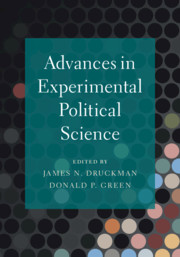Book contents
- Frontmatter
- Contents
- List of Figures
- List of Tables
- List of Boxes
- List of Contributors
- Acknowledgements
- 1 A New Era of Experimental Political Science
- Part I Experimental Designs
- Part II Experimental Data
- 8 Experiments, Political Elites, and Political Institutions
- 9 Convenience Samples in Political Science Experiments
- 10 Experiments Using Social Media Data
- 11 How to Form Organizational Partnerships to Run Experiments
- Part III Experimental Treatments and Measures
- Part IV Experimental Analys is and Presentation
- Part V Experimental Reliability and Generalizability
- Part VI Using Experiments to study Identity
- Part VII Using Experiments to Study Government Actions
- Author Index
- Subject Index
11 - How to Form Organizational Partnerships to Run Experiments
from Part II - Experimental Data
Published online by Cambridge University Press: 08 March 2021
- Frontmatter
- Contents
- List of Figures
- List of Tables
- List of Boxes
- List of Contributors
- Acknowledgements
- 1 A New Era of Experimental Political Science
- Part I Experimental Designs
- Part II Experimental Data
- 8 Experiments, Political Elites, and Political Institutions
- 9 Convenience Samples in Political Science Experiments
- 10 Experiments Using Social Media Data
- 11 How to Form Organizational Partnerships to Run Experiments
- Part III Experimental Treatments and Measures
- Part IV Experimental Analys is and Presentation
- Part V Experimental Reliability and Generalizability
- Part VI Using Experiments to study Identity
- Part VII Using Experiments to Study Government Actions
- Author Index
- Subject Index
Summary
There is growing interest in bridging the gap between science and society. Fostering relationships between researchers and practitioners, such as partnering to conduct experiments, is an increasingly popular way to do that. Yet, despite the growing number of such partnerships, academics who are new to them often lack guidance about considerations to keep in mind and the steps involved. This chapter bridges the gap. I discuss the benefits, challenges, and goals of organizational partnerships as well as provide a step-by-step guide for academics beginning new ones. Throughout, I emphasize the fact that such partnerships entail building new working relationships with people who have diverse forms of knowledge. As a result, both a learning mindset as well as a relational mindset are necessary.
Keywords
- Type
- Chapter
- Information
- Advances in Experimental Political Science , pp. 199 - 216Publisher: Cambridge University PressPrint publication year: 2021
- 6
- Cited by

